Onam Celebration at TJIS: Embracing Tradition and Unity
At TJIS, we believe in celebrating cultural diversity and fostering a sense of unity among our students. The joyous festival of Onam, a significant event in the state of Kerala, India, was celebrated with great enthusiasm and spirit at our school. Onam marks the annual harvest festival and symbolizes unity, prosperity, and the homecoming of the legendary King Mahabali. Our celebration aimed to educate and immerse students in the cultural richness that Onam represents, helping them connect with Indian traditions and values. Best cbse school in Hyderabad
An Overview of the Event
The Onam celebration began with an engaging assembly that captured the essence of the festival through vibrant performances and activities. The event aimed to showcase the traditions associated with Onam while encouraging students to appreciate the importance of community, culture, and heritage. P. Rishitha from Grade X delivered an insightful speech that set the tone for the celebration. She eloquently shared the story of Onam, emphasizing its significance as a harvest festival that unites people regardless of their backgrounds, highlighting the values of sharing, gratitude, and harmony.
The Cultural Significance of Onam
Onam, one of Kerala’s most revered festivals, has its roots in the ancient legend of King Mahabali, a just and benevolent ruler loved by his people. According to the legend, Mahabali’s reign was a time of great prosperity and equality. However, his growing influence prompted the gods to intervene, and Lord Vishnu, in his Vamana avatar, sent Mahabali to the netherworld. As a reward for his kindness and devotion, Mahabali was granted permission to visit his people once a year. Onam celebrates this annual visit, symbolizing the return of a golden age of prosperity, unity, and harmony.
P. Rishitha highlighted these values in her speech, encouraging students to see Onam not just as a festival of feasts and celebrations but as an opportunity to reflect on unity, gratitude, and cultural pride. She spoke about the beautiful traditions of Kerala that come alive during Onam, such as the creation of Pookalam (floral carpets), the preparation of the elaborate Onam Sadhya (traditional feast), and the various folk art forms that showcase Kerala’s vibrant heritage.
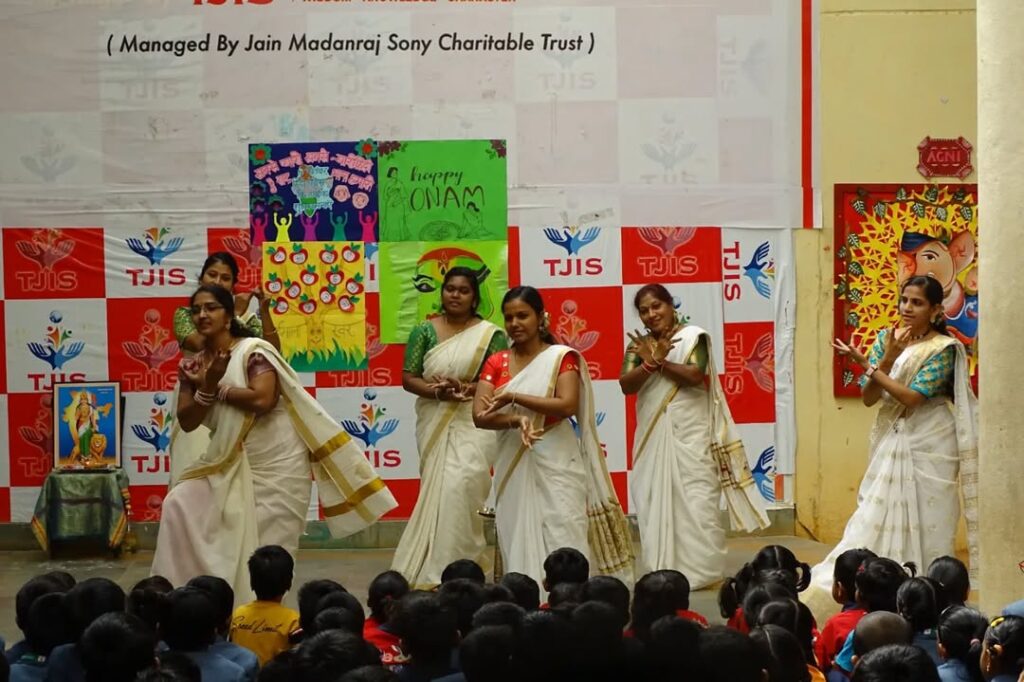
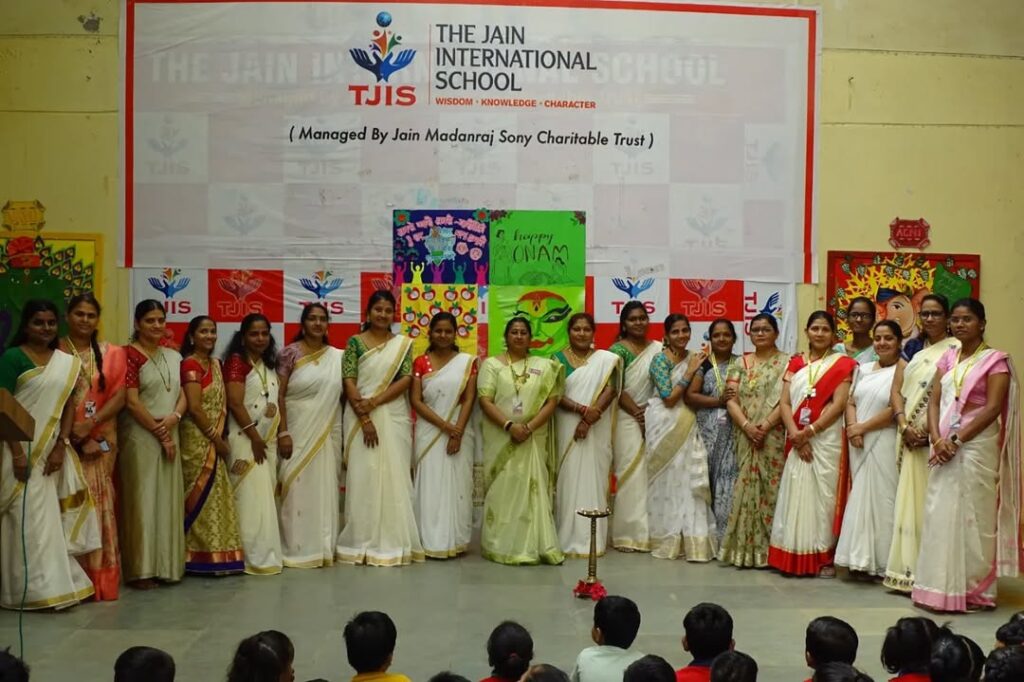
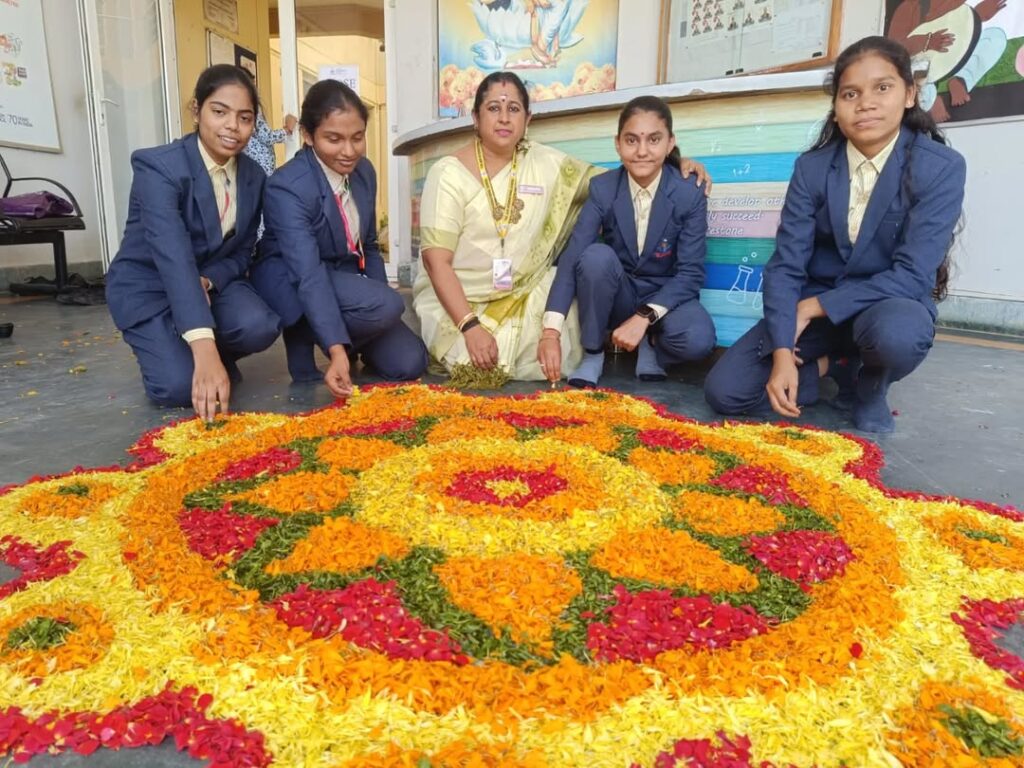
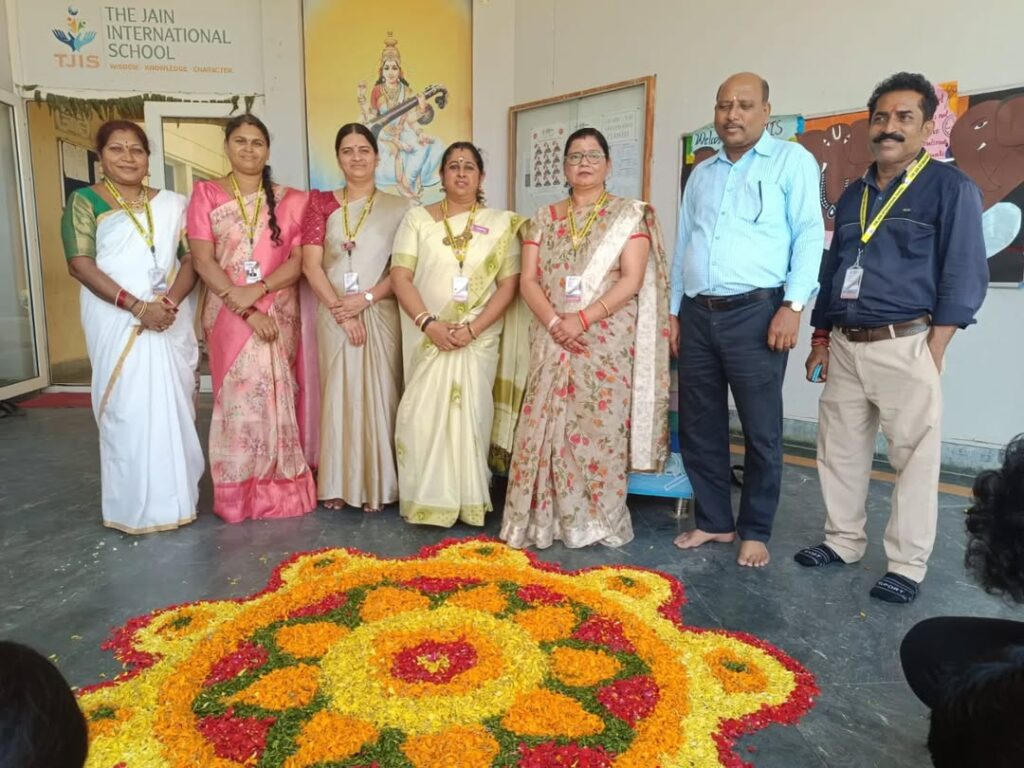
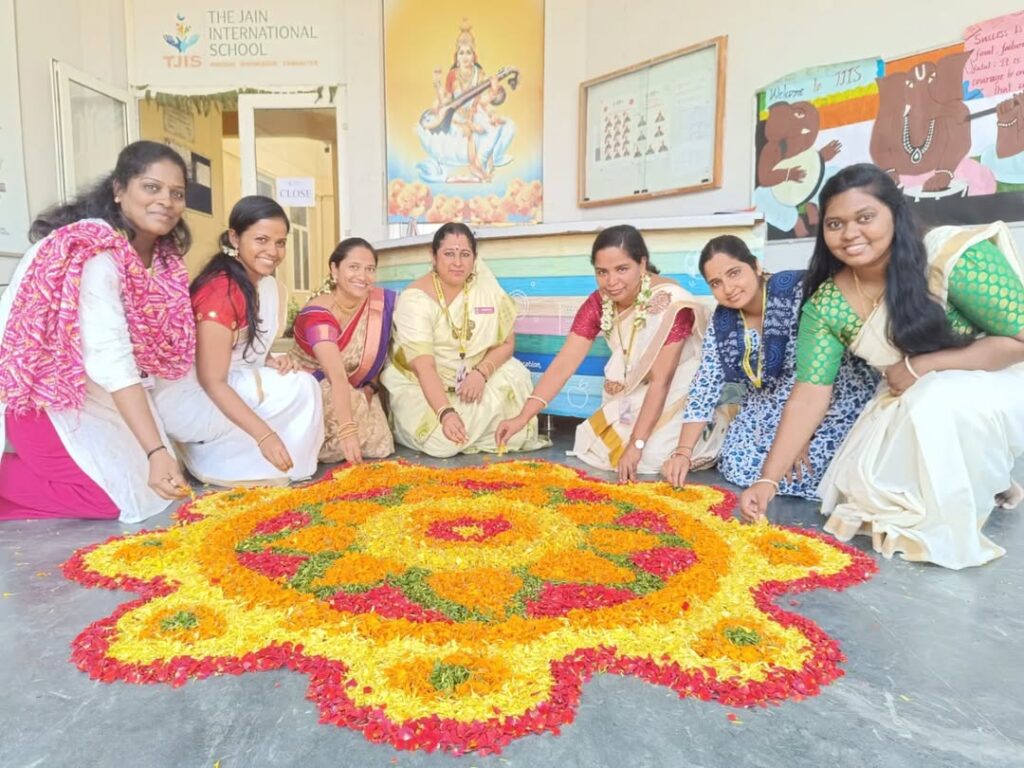
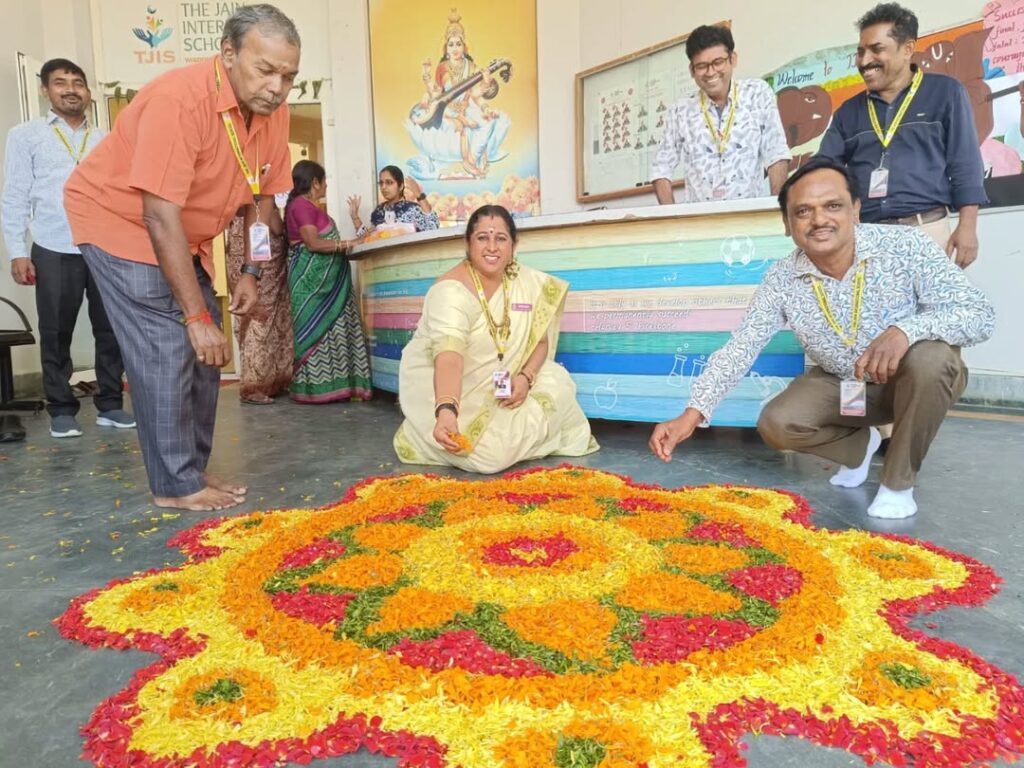
Thiruvathira Dance: A Cultural Showcase
One of the most captivating moments of the event was the mesmerizing Thiruvathira dance, performed by Ms. Mrudhula and her team. Thiruvathira is a traditional dance form of Kerala, typically performed by women as part of the Onam festivities. The dancers, dressed in traditional attire, moved gracefully to the rhythmic beats of classical music, portraying the elegance and poise of Kerala’s cultural heritage. The performance was not just a visual delight but also a representation of the harmony and unity that Onam promotes.
The dance depicted the grace and beauty of Kerala’s women, highlighting the rich traditions passed down through generations. With synchronized steps and flowing movements, the dancers conveyed a sense of rhythm and balance, captivating the audience and leaving them with a deeper appreciation for Kerala’s culture. The intricate patterns and formations created by the dancers symbolized the unity that Onam brings, as people from all walks of life come together to celebrate this festival.
Principal’s Address: Connecting with Roots and Celebrating Diversity
Principal Ms. S. Sumam Nair addressed the assembly, emphasizing the importance of festivals like Onam in preserving our cultural roots and promoting unity. She highlighted how such celebrations provide an opportunity for students to connect with their heritage and understand the diverse cultures that make up India’s rich tapestry. Ms. Nair encouraged students to embrace these festivals as not just events but as experiences that foster a sense of belonging, respect, and understanding among communities.
She further spoke about the need to maintain cultural awareness in an increasingly globalized world, where traditions can often be overlooked. By celebrating festivals like Onam at school, she explained, students gain a sense of identity and pride, learning about the values that shape Indian society. Her words inspired the students to view festivals as not only joyous occasions but as meaningful events that bring people together, transcending regional and cultural boundaries.
Reflections on the Role of Festivals in Promoting Unity
Onam, like many other Indian festivals, serves as a reminder of the importance of unity and harmony in society. The spirit of Onam is not confined to the state of Kerala; it extends beyond geographical boundaries, inviting everyone to participate in the celebration of togetherness. The festival underscores the idea that despite differences in language, religion, and culture, festivals have the power to unify and bring joy to people’s lives.
At TJIS, we strive to create an inclusive environment where students of all backgrounds come together to celebrate the diverse cultural heritage of India. By organizing events like the Onam celebration, we aim to instill values of respect, appreciation, and unity in our students. These celebrations also provide an opportunity for students to witness and participate in cultural performances, enhancing their understanding of India’s rich traditions and customs.
Onam’s Traditions and Their Modern Relevance
The celebration of Onam is marked by various traditional activities that hold deep cultural significance. One such tradition is the creation of Pookalam, a colorful arrangement of flowers on the ground, symbolizing the welcome of King Mahabali. At TJIS, students participated in making a Pookalam, showcasing their creativity and teamwork. Activities like these not only bring students closer to the festival but also teach them about the symbolism behind these beautiful traditions.
The Onam Sadhya, an elaborate vegetarian feast served on banana leaves, is another highlight of the festival. The Sadhya reflects the harvest’s bounty and the spirit of sharing and togetherness that Onam promotes. While we may not have recreated the feast at school, the idea of sharing and community spirit was present in the way students came together to celebrate the day.
In today’s world, where technology and modern lifestyles dominate, festivals like Onam remind us of the importance of staying connected to our roots. They encourage us to pause, celebrate the simpler things in life, and honor the traditions that have been passed down through generations. By promoting such festivals in educational settings, schools like TJIS play a crucial role in preserving and celebrating India’s cultural diversity.
Looking Ahead: Fostering Cultural Appreciation Among Students
At TJIS, we are committed to providing a holistic education that goes beyond academics. Celebrating festivals like Onam is an integral part of this approach, helping students develop a well-rounded understanding of Indian culture. By engaging in these events, students not only learn about traditions but also gain a sense of pride and identity that is essential in their formative years.
We aim to continue organizing such events, allowing students to explore and appreciate the diverse cultures within India. Each celebration is an opportunity for them to connect with their heritage, embrace cultural differences, and promote a sense of unity. Our mission is to create an environment where every student feels a sense of belonging and takes pride in the rich cultural legacy of India.
Conclusion: Celebrating Onam with Joy and Cultural Pride
The Onam celebration at TJIS was a joyful and culturally enriching event that left a lasting impression on everyone present. The assembly, marked by insightful speeches, graceful dance performances, and thoughtful reflections, was a tribute to the beauty and significance of Onam. It reminded us of the importance of staying connected to our roots and celebrating the diversity that defines us.
As the event concluded, a sense of joy and pride filled the atmosphere. The celebration successfully highlighted the values of unity, harmony, and gratitude that Onam embodies. At TJIS, we look forward to continuing these celebrations, helping our students appreciate the depth and diversity of Indian culture.
